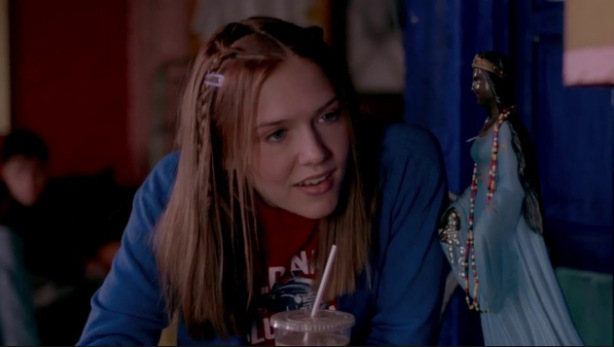The pinnacle of what it meant to be a part of a certain music scene in the Pacific Northwest happened long before Girl, a 1998 Jonathan Kahn film based on Blake Nelson’s novel of the same name. And yet, with an adapted script by David E. Tolchinsky, the narrative brings to life the earlier feel of the decade, when Portlandians were segregated by West Hills suburbanites and downtown grunge kids. In the former category is Andrea Marr (Dominique Swain), channeling her very best version of Angela Chase.
Her sheltered life is punctuated by being an only child to doting, older parents and a constant drive to succeed academically. And in spite of her best friend, Darcy (Selma Blair)–the Sharon Cherski of the plot–being just slightly prissier than she, Andrea still manages to float with other groups and types of people, including Cybil (Tara Reid, when acting was still her pursuit)–the Rayanne Graff in the mix–an underachiever who places importance solely on her band, The Badheads, which later becomes Thrift Store Apocalypse, and Rebecca (Summer Phoenix), a grunge-esque friend from childhood. By orbiting among Cybil and her bandmates, Richard (Christopher Masterson) and Greg (David Moscow), Andrea ends up going to a show featuring The Color Green, a local band with Todd Sparrow (Sean Patrick Flanery) as its frontman. Instantly hooked on his good looks, aloof aura and musical stylings, Andrea becomes a hopeless and irrevocable groupie.
And yet, just days prior, Andrea was at a party lamenting within her internal dialogue, “Poor girls. To spend your whole life hoping you’d get noticed by some thick-necked, beer-guzzling moron.” Lo and behold, in her search to find excitement, becoming a groupie is the natural trajectory. Angela, too, was an overly protected suburbanite who just wanted to rebel in some way to give her life more meaning. Like her Jordan Catalano obsession, Andrea’s full-fledged fixation with Todd prompts her to do things she never would have dreamed of before, like dressing in a more revealing way. The cow-patterned dress (it was the 90s, I don’t know) she ends up choosing for the show makes her think, “For the first time in my life, I felt like an individual,” after which a scene of every other girl wearing the same dress outside the venue occurs.
Running into her sort of Brian Krakow of the movie, Andrea settles for sleeping with Kevin (Channon Roe), a guy she gets trampled to the floor with at Color Green’s show as Cybil plays before him. Deciding Kevin can serve the purpose of de-virginizing her when she sees him again, Andrea surrenders to having sex for the first time with someone who isn’t Todd.
In fact, it’s only while listening to pre-Color Green Todd on Kevin’s record player that she can get aroused, imagining he’s watching her from the window above. This moment is one of a few surreal fantasies Andrea has of Todd, including one where he’s eating an apple next to her bed (the symbolism is obviously strategic). My So-Called Life would also cater to these flights of fancy in terms of Angela’s daydreaming propensities.
As Andrea becomes increasingly allured by the lifestyle of Todd’s world, she can’t help but romanticize it with musings like, “there was a thin line between being homeless and being an artist.” And as she falls deeper into the hole, her resemblance to Angela increases–donning that Rayanne-specific style both sartorially and hair-wise (barrettes are key).
Yet, in the end, the groupie life can’t sustain her the way it does when she first becomes fascinated with it. Just as Angela gets over the hurdle of her hang-up toward the end of the series after seeing that Jordan is actually pretty inferior to her, so, too, does Andrea, determined to persist on her path to Brown in the fall–even though Todd asks her to come with him on tour.
This about-face realization speaks to her coming of age and getting to know herself more fully (and not just in the sexual sense). While lusting after a guy can feel necessary at a certain point in one’s adolescence–and oftentimes at any age–when a girl finally takes a step back to see that men ain’t shit, the result can be quite rewarding. And in this, Andrea and Angela differ, because the latter just couldn’t give up the dick.





















